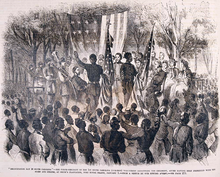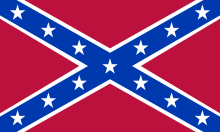David Hunter
American Union general during the Civil War (1802–1886)
David Hunter (21 July 1802 – 2 February 1886) was a United States Army officer during the American Civil War.




Quotes
edit1860s
editGeneral Order No. 11 (May 1862)
edit- General Order No. 11 (9 May 1862), by Maj. Gen. David Hunter, Department of the South
- The three States of Georgia, Florida and South Carolina, comprising the military department of the south, having deliberately declared themselves no longer under the protection of the United States of America, and having taken up arms against the said United States, it becomes a military necessity to declare them under martial law. This was accordingly done on the 25th day of April, 1862. Slavery and martial law in a free country are altogether incompatible; the persons in these three States — Georgia, Florida, and South Carolina— heretofore held as slaves, are therefore declared forever free.
Report to Edwin M. Stanton (June 1862)
edit- Report to Secretary of War Edwin M. Stanton (June 1862), Hilton Head, South Carolina: Headquarters, Department of the South
- The experiment of arming the blacks, so far as I have made it, has been a complete and marvellous success. They are sober, docile, attentive, and enthusiastic — displaying great natural capacities in acquiring the duties of the soldier. They are now eager beyond all things to take the field and be led into action; and it is the unanimous opinion of the officers who have had charge of them, that, in the peculiarities of this climate and country, they will prove invaluable auxiliaries — fully equal.
- As quoted in Report of the military services of Gen. David Hunter, U.S.A., during the war of the rebellion (1873), made to the U.S. War Department, p. 25
Letter to Jefferson Davis (1863)
edit- Letter to Jefferson Davis (1863)
- You say you are fighting for liberty. Yes you are fighting for liberty: liberty to keep four millions of your fellow-beings in ignorance and degradation;–liberty to separate parents and children, husband and wife, brother and sister;–liberty to steal the products of their labor, exacted with many a cruel lash and bitter tear;–liberty to seduce their wives and daughters, and to sell your own children into bondage;–liberty to kill these children with impunity, when the murder cannot be proven by one of pure white blood. This is the kind of liberty–the liberty to do wrong–which Satan, Chief of the fallen Angels, was contending for when he was cast into Hell.
- As quoted in The Smart Culture: Society, Intelligence, and Law, by Robert L. Hayman, pp. 59–61
1870s
editReport of the military services of Gen. David Hunter (1873)
edit- Report of the military services of Gen. David Hunter, U.S.A., during the war of the rebellion (1873), made to the U.S. War Department
- From the beginning I urged upon the Government, in the strongest terms, the enlistment of negro troops, the former slaves of the rebels, not only as adding to the number and efficiency of our own forces, but chiefly on account of its depriving the enemy of just so much labor in their fields.
- pp. 18–19
Quotes about Hunter
edit- One of the few 'avowed anti-slavery officers in the army', Hunter had caused a huge commotion only a month before when he had announced unilaterally that all rebel-owned slaves under his jurisdiction were to be 'forever free.' Abraham Lincoln, who knew and liked Hunter, had sternly countermanded him; the president insisted that 'commanders in the field' could not make such decisions... Hunter envisioned a different result. He wanted former slaves to have voting rights... The old warrior could not have been happy at the ultimate outcome.
- Daniel W. Crofts, "Runaway Masters" (22 June 2012), The New York Times, New York: The New York Times Company
External links
edit- Encyclopedic article on David Hunter on Wikipedia
- Media related to David Hunter on Wikimedia Commons